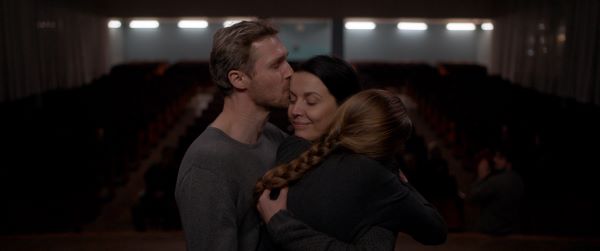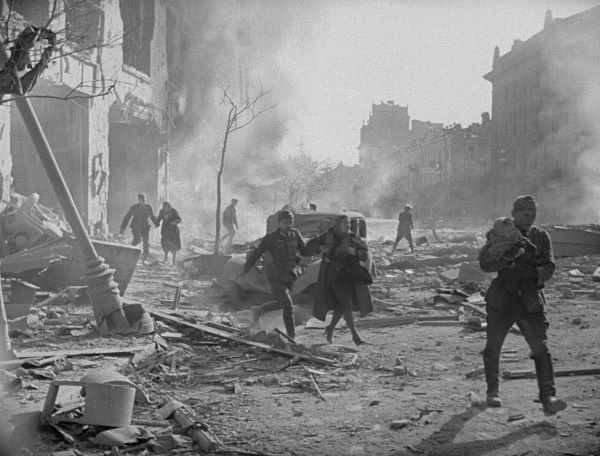This week’s First Look festival at the Museum of the Moving Image in Astoria, New York, brings 40 feature films from 30 countries, including two from Ukraine, which is definitely top of mind right now. Both Reflection and Babi Yar. Context revolve around wars involving Ukraine and its neighbor and recent invader, Russia, reminding us that the current situation in Eastern Europe isn’t unprecedented at all, but history sadly repeating itself.
The intense drama Reflection, set in 2014 during the first year of the Russian-Ukrainian war, centers on a surgeon, Serhiy (Roman Lutskyi), who gets more than he bargained for after volunteering for the front. On the way there, he becomes lost and ventures into Russia, where he’s captured and imprisoned in an underground facility, and where those around him appear wholly indifferent to human life. Despite his medical training, Serhiy mostly witnesses the torture of prisoners and brings expired bodies to an incinerator for disposal.
About midway, Serhiy is released and returns to the life he left behind, including a comfortable apartment and an ex-wife (Nika Myslytska) and daughter (Nadiya Levchenko) who welcome his return. Serhiy, however, struggles with all he has seen as well as his actions while in captivity, including one he won’t share, something related to Andrii (Andriy Rymaruk), his ex-wife’s second husband whom the Russians have captured.
Director Valentyn Vasyanovych uses long, static shots that immerse us in the characters’ lives, although the effect changes over the course of the film. At first, the use of the deliberately pacing highlights the innocence, even tediousness of Serhiy’s existence, but during his imprisonment, it arouses empathy as he’s tortured in seemingly real time or, in one very tense sequence, contemplates suicide. During the second half, the lengthy takes allow us to drink in Serhiy’s facial expressions, body language, and silences, all of which reflect the burden he carries.
Casting-wise, the standouts are Lutskyi for his gripping emotional transformation and portrayal of PTSD and Levchenko as a youngster who suffers her own war-related tragedy. While the idea that humans find healing from wartime trauma through love and intergenerational bonds isn’t new, the extremely mannered style in which Vasyanovych presents the psychological effects of war is highly relevant, especially for a country locked in a cycle of bloodshed with its neighbor.
Meanwhile, the haunting documentary Babi Yar. Context repurposes homemade footage taken in Ukraine during the early 1940s, when it was invaded by Nazi Germany. The title refers to a ravine, Babi Yar, located near Kiev, which served as a mass grave for more than 33,000 Jews executed by the local police. The film also points out how Ukrainians turned a blind eye to the mass murders of Jewish neighbors, and in some cases even persecuted the victims.
As much of the footage was taken by invading Germans, there is an eerie, voyeuristic quality as random people are beaten, dragged through the streets, or worse—they avert their eyes from the remorseless camera. Adding to the sense of disquiet are clips from outside Kyiv and Lviv revealing the results of the Nazis’ march across the countryside—lots of corpses, many still visibly fresh, and not all necessarily soldiers. We don’t see the actual executions at Babi Yar but the aftermath in which endless piles of clothing and other personal effects—some belonging to children—litter the ravine. At the same time, the testimonies of Jewish survivors at a postwar tribunal speak to what lengths people will go to stay alive.
In some of the film’s most fascinating moments, it touches on a people’s capacity to forget its own sins, even if they happened recently. For example, the aforementioned tribunal sentenced to death several German officers who helped carry out the genocide. Their execution draws an eager, bloodthirsty public that seems to have conveniently forgotten its own complicity in the same crimes.
Scenes also hint at how Ukrainians viewed their relationship to Russia and the larger Soviet Empire: tenuous at best. As opposed to putting up much resistance to the Nazis, Ukrainians appear quick to welcome Germany as a liberator. Posters of Josef Stalin in public squares come down and go back up again, depending on how the war is going.
Ultimately, director Sergei Loznitsa performs nothing less than a miracle by stitching together found footage from multiple sources into a coherent, unsettling depiction of war and human loss that resonates 80 years later.
Both films screen on March 20.


















Leave A Comment